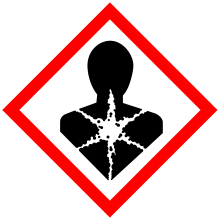Phenyl isothiocyanate
| |||
| Names | |||
|---|---|---|---|
| IUPAC name
Isothiocyanatobenzene | |||
| Other names
Thiocarbanil | |||
| Identifiers | |||
| 103-72-0 | |||
| ChemSpider | 7390 | ||
| |||
| Jmol-3D images | Image | ||
| PubChem | 7673 | ||
| |||
| Properties | |||
| C7H5NS | |||
| Molar mass | 135.19 g/mol | ||
| Appearance | Colorless liquid with a pungent odor[1] | ||
| Density | 1.1288 g/cm3[1] | ||
| Melting point | −21 °C (−6 °F; 252 K)[2] | ||
| Boiling point | 221 °C (430 °F; 494 K)[2] | ||
| negligible [1] | |||
| Solubility | ethanol, ether[2] | ||
| Hazards | |||
| Main hazards | toxic, flammable[1] | ||
| GHS pictograms |    [2] [2] | ||
| GHS signal word | Danger[2] | ||
| H331, H311, H301, H314, H317, H334, H361[2] | |||
| P301+310, P280, P312, P302+350, P301+330+331, P305+351+338, P310, P261, P304+341, P342+311, P280[2] | |||
| EU classification | | ||
| R-phrases | R23/24/25 R34 R42/43 R63[2] | ||
| S-phrases | S23 S26 S28 S36/37/39 S38 S45 [2] | ||
| Except where noted otherwise, data is given for materials in their standard state (at 25 °C (77 °F), 100 kPa) | |||
| | |||
| Infobox references | |||
Phenyl isothiocyanate (PITC) is a reagent used in reversed phase HPLC. PITC is less sensitive than o-phthaldehyde (OPA) and cannot be fully automated. PITC can be used for analysing secondary amines, unlike OPA.
It is also known as Edman's reagent and is used in Edman degradation.
Commercially available, this compound may be synthesized by reacting aniline with carbon disulfide and concentrated ammonia to give the ammonium dithiocarbamate salt. Further reaction with lead(II) nitrate gives phenyl isothiocyanate:[3]
Another method of synthesizing involves a Sandmeyer reaction using aniline, sodium nitrite and copper(I) thiocyanate.
See also
- Isothiocyanate
- Naphthyl isothiocyanate
References
- ↑ 1.0 1.1 1.2 1.3 http://www.caslab.com/Phenyl_isothiocyanate_CAS_103-72-0/
- ↑ 2.0 2.1 2.2 2.3 2.4 2.5 2.6 2.7 2.8 2.9 http://www.chemexper.com/cheminfo/servlet/org.dbcreator.MainServlet?query=entry._entryID%3D1288243&target=entry&action=PowerSearch&format=google2008
- ↑ F. B. Dains, R. Q. Brewster, and C. P. Olander. "Phenyl isothiocyanate". Org. Synth.; Coll. Vol. 1, p. 447


